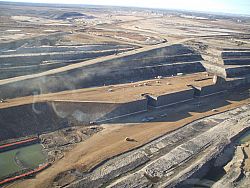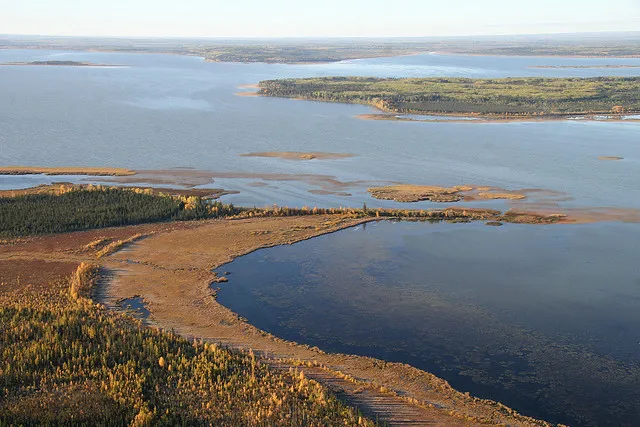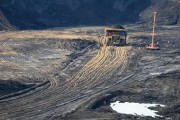Despite the controversy over the federal government’s overhaul of environmental laws in Bill C-38, which recently passed third reading in the House of Commons, federal ministers have stuck to the script, insisting that cutting back on federal environmental oversight is the key to ensuring resource development happens in an efficient and “responsible” manner. However, the recent revision of an application by Shell Canada to expand an oilsands mine illustrates the type of sensible environmental protection and sober reflection Canadians risk losing as a result of the changes outlined in the federal bill.
Last December, as a member of the Oil Sands Environmental Coalition, the Pembina Institute wrote to the joint federal-provincial panel charged with reviewing the Shell Jackpine expansion project to highlight significant omissions in the environmental assessment. Those omissions included information about known and expected future oilsands developments, predictable forest fires and planned logging activities.
By failing to take these and other known disturbances into account, Shell’s application would underestimate the cumulative environmental footprint in the region by a factor of 12, according to the Pembina Institute’s analysis. And without considering the impacts of the Shell project in conjunction with the impacts from other disturbances in the area, the panel could not know if the project would exceed environmental thresholds and result in unacceptable environmental impacts overall.
What makes this particular environmental review noteworthy, in light of the Harper government’s talking points on Bill C-38, is this: While the provincial review found no need to look further into the environmental impacts associated with this proposed project, the federal review panel agreed with us and sent the application back to Shell to make sure the cumulative impacts would be incorporated in the proposal.
Back to the drawing board
 We saw the outcome of that intervention last month, as Shell tabled a precedent-setting revision to its environmental assessment. To its credit, Shell’s new environmental assessment now reveals the cumulative impacts of proposed developments over thousands of hectares of habitat in Canada’s Boreal Forest, along with the logging commitments that have been made and the likely rate of forest fires that cannot be prevented. Accounting for anticipated impacts at such a detailed and comprehensive level is critically important given the planned expansion of oilsands development in the region; for the first time, the data Shell has included in its application will give the public and decision makers the full picture of environmental consequences from oilsands development using current technologies and practices.
We saw the outcome of that intervention last month, as Shell tabled a precedent-setting revision to its environmental assessment. To its credit, Shell’s new environmental assessment now reveals the cumulative impacts of proposed developments over thousands of hectares of habitat in Canada’s Boreal Forest, along with the logging commitments that have been made and the likely rate of forest fires that cannot be prevented. Accounting for anticipated impacts at such a detailed and comprehensive level is critically important given the planned expansion of oilsands development in the region; for the first time, the data Shell has included in its application will give the public and decision makers the full picture of environmental consequences from oilsands development using current technologies and practices.
Without the federal review requirement, decisionmakers would not have had access to that complete picture, since this project had already passed Alberta’s assessment. Now, the Shell Jackpine assessment paints a very different — and more disturbing — picture of the future for the landscape north of Fort McMurray. The new assessment shows that 23 lakes in the region will exceed “critical loads” for acid deposition and that some soils and landscapes will exceed the Government of Alberta’s targets for acceptable damage to ecosystems. Impacts on wildlife that were previously reported as “low” now appear “moderate” and “high”.
In short, the real impacts of unconstrained oilsands expansion are beginning to emerge.
Implications for environmental protection
What does this case tell us about the environmental assessment process, and the watchdog role played by environmental groups such as the Pembina Institute? It demonstrates that two of the central arguments the federal government has been using to justify the need to weaken environmental laws don’t stand up to scrutiny.
First, despite what Ottawa has said recently, federal oversight is essential. The Alberta government had already said the initial impact assessment was adequate, despite the Pembina Institute’s highlighting of the obvious gaps. Only a rigorous parallel federal assessment required the company to resubmit its application with the correct information regarding cumulative impacts.
Second, it’s important to note that in this case, as in many cases, the delay in approving this project was the result of vital gaps in the company’s original application — not an excess of regulatory red tape, as the government has claimed.
Watchdog groups encourage sober second thought
More importantly, the Shell Jackpine intervention powerfully underlines the importance of watchdog groups, like the Pembina Institute, who serve Canadians by engaging in environmental review processes to ensure regulations are followed and science is fairly applied to major decisions on projects like dams, pipelines, mines and oilsands developments. In this case, our work has ensured that the panel reviewing the project will have the necessary information to make an informed decision about whether the project should go ahead as planned and how the negative impacts should be mitigated.
While some people have been critical of the time required to complete regulatory approvals for major energy projects, this case illustrates the importance of thoroughly reviewing the implications of those decisions. Ensuring stakeholders, scientists and public interest watchdogs have the opportunity to contribute to the discussion is essential to generating an informed, balanced debate.
The use of omnibus legislation to overhaul Canada’s environmental laws and the reduced transparency that will result from the changes in Bill C-38 illustrate that democratic decision-making is a core Canadian value that is under threat. Bad decisions get made in the dark, and with its changes to the Canadian Environmental Assessment Act, the federal government is turning out the lights.










